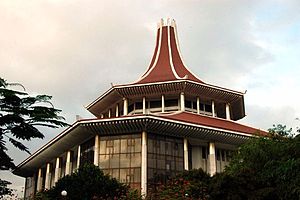 |
| (an old photo) |
But a part of these heroes sleep in an open space under a bridge in Jeddah city tonight also since they are considered by Saudi kingdom as illegal migrants who must be repatriated. The number is well over 750 including more than 60 women, sources say.
The fate is similar for a number of other migrant workers from countries like Malaysia, Indonesia and Bangladesh. Jeddah is a hub of present day slave trade and the issue of the stranded migrants is also part and parcel of the city.
United National Party (UNP) MP Ajith P. Perera says that they are needed to be brought back immediately. He said that some of these employees have migrated to Saudi Arabia via foreign employment agencies and they have failed to secure employment due to regulations of Saudi government. Other sources say that the bulk of these Lankans had travel led to Saudi Arabia on short-term visas and later over-stayed with the intention of securing employment. There are also those who had entered Saudi Arabia on religious pilgrimages and later stayed behind. There are others who have fled from the workplaces violating the service agreements mostly due to inhuman treatment. Most of them have registered in the Sri Lankan Embassy in Saudi Arabia and awaiting expatriation.
The UNP MP proposed the government to bring them back home in a chartered plane considering the pathetic situation they are facing. A good campaign. This is what the government of Sri Lanka wants to shun. The government preferably awaits until the kith and kin of the bereaved migrant employees collect money and send them to bring them home. Saudi police may have already informed the Sri Lanka embassy to take action to repatriate them.
Sri Lanka Foreign Employment Bureau said last week that the government of Saudi Arabia had agreed to provide temporary jobs for 5,000 Sri Lankan expatriate workers who were staying in the Kingdom illegally. Perhaps this may help them to fetch some money to buy their air ticket.
Sri Lanka Foreign Employment Bureau says that the government of Sri Lanka is facing difficulty in bringing back them to the home country. However, 30 to 35 of these expatriate workers are brought home, the Bureau says.
Over 600,000 Sri Lankans are employed in Saudi Arabia. The majority of them are housemaids and other domestic aide.
Minister Basil Rajapaksa said on March 12 addressing the inaugural ceremony of the Rata Viru Piyasa programme of building houses for Sri Lankan expatriate workers at the Galagedara that it was the foreign exchange earned by expatriate workers which enabled the country to purchase much needed weaponry and aircraft for the successful conclusion of the humanitarian operation which liberated the country from terrorism.
Then why don't the heroes about whom we speak here deserve a humanitarian operation? It will be an actual humanitarian operation after all.
- Ajith Parakum Jayasinghe

![Reblog this post [with Zemanta]](http://img.zemanta.com/reblog_e.png?x-id=8ee2e18f-88f2-4890-8f70-6843dd56e33b)

![Reblog this post [with Zemanta]](http://img.zemanta.com/reblog_e.png?x-id=55b8fb61-1f83-41b2-987b-35f8385059d4)











![Reblog this post [with Zemanta]](http://img.zemanta.com/reblog_e.png?x-id=d719dcae-3621-49fc-adf7-4135a00839f8)

![Reblog this post [with Zemanta]](http://img.zemanta.com/reblog_e.png?x-id=8ac265c4-523f-4600-b1ca-64631deca149)

![Reblog this post [with Zemanta]](http://img.zemanta.com/reblog_e.png?x-id=53b635c4-2eee-4f78-973d-5ec9554e4687)



